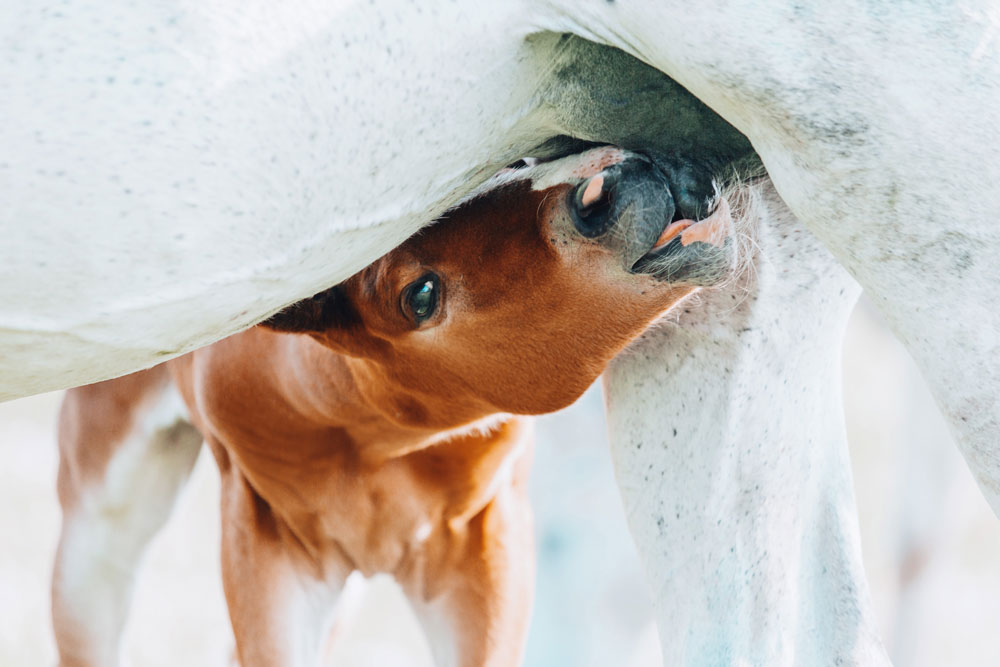In Part 1: Why Horses Lose Weight During the Winter, we looked at some common reasons for wintertime weight loss in horses. But how do you know if your horse is dropping weight? And what is a healthy weight range for your horse?
These are both good questions.
There isn’t a single weight range that’s ideal for all horses, because it varies greatly between breeds and disciplines. And very few people are lucky enough to have an equine scale on hand. But it is possible to determine what’s normal for your horse so that you know when something changes. Here are a few tactics for keeping tabs:
Do a Monthly Photo Shoot
If you’ve taken the SUCCEED Challenge, you already know how valuable photos can be in tracking your horse’s condition. Make a goal to snap a few pics of your horse from several angles each month, and then compare the photos.
Manually Feel for Changes
Of course, all of the beauty shots in the world won’t help you assess your horse’s condition if he’s covered in his winter woolies. Make sure to remove winter blankets and run a hand over your horse from ears to hoof to monitor his weight manually. Pay close attention to his back, ribs and croup (in that order), as these are the first three areas to lose weight.
Use a Weight Tape
For less than $5, you can purchase an equine weight tape at your local feed store that can help measure how much your horse weighs. (You can also use a standard tape measure to capture your horse’s heart girth and length, and then calculate heart girth X heart girth X length, divided by 300, + 50 = weight … we prefer the weight tape.) Again, a horse’s exact weight is less helpful than knowing when he fluctuates, so keep that in mind.
Determine Your Horse’s Body Condition Score
Vets use a standard body condition scoring system called the Henneke Body Condition Scoring system to tell whether or not a horse is at an appropriate weight. You can’t really determine an “average” weight, because a thoroughbred is going to look very different than a Quarter Horse broodmare — and both might be in tip-top shape. But horses usually gain (and lose!) weight in a specific order. Here’s what you should look for:
- Loin: A thin horse’s spine will stick up and he’ll have a ridge down his back. This is the first place you’ll notice weight gain or loss.
- Ribs: You should be able to feel — but not see — a healthy horse’s ribs.
- Tailhead/Croup: In a too-thin horse, the tailhead is prominent is easily seen.
- Withers: This varies between breeds, but if your horse is too thin, the shape of the withers will be very visible.
- Neck: you shouldn’t be able to see the bone structure of the neck; be sure your horse’s poll isn’t hollowed out.
- Shoulder: As a horse loses weight, you’ll see more and more definition between the shoulder and the elbow.
Check out a hands-on application of the Henneke BCS system by Holly Werner, senior associate editor of Horse Illustrated magazine with overweight, underweight, and ideal horse models:
Behavior and Performance
We talk a lot about how poor health can equal a bad attitude, and the same is true when a horse is underweight. If your horse seems lethargic, unwilling to work, or unusually grouchy when you show up, evaluate his general condition. If he’s not getting the nutrients and calories he needs to stay fit and healthy, he’s not going to be happy — and you’re not going to be happy with his performance.
Up Next: Strategies for Winter Weight Gain (or Maintenance)
Now that you know what to look for and how to identify a horse that is losing weight, we’ll talk about how to deal with wintertime weight loss in Part 3: Strategies for Winter Weight Gain (or Maintenance). Also be sure to check out Part 1: Why Horses Lose Weight in Winter for common culprits of fluctuating weight.
Be sure to subscribe to the SUCCEED blog or sign up for email notifications in the sidebar so you don’t miss Part 3: Strategies for Winter Weight Gain (or Maintenance).



